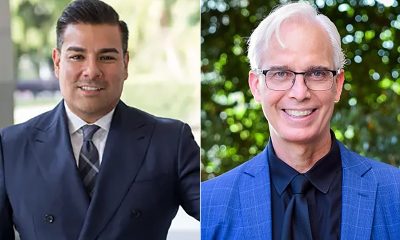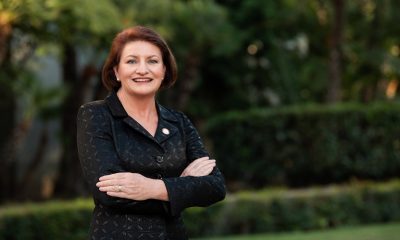Congress
Dianne Feinstein dies
Calif. Democrat elected to U.S. Senate in 1992
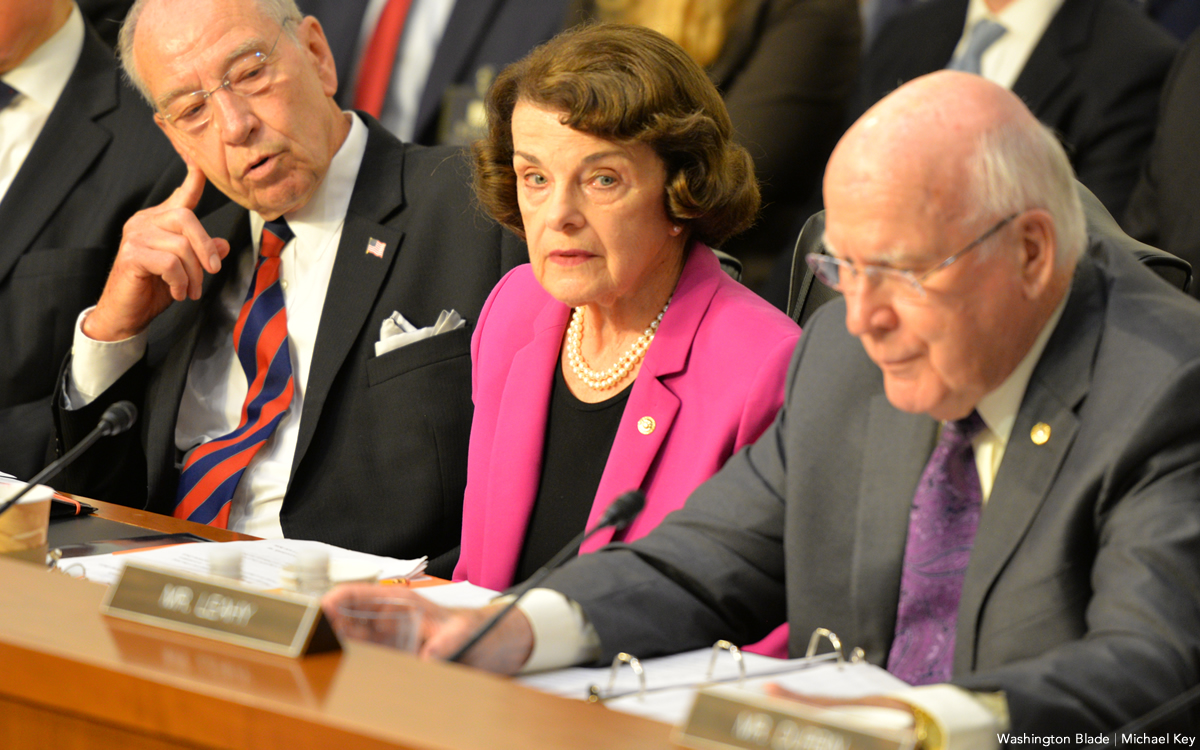
WASHINGTON — U.S. Sen. Dianne Feinstein (D-Calif.) has died at the age of 90.
Her office in a statement said the California Democrat, who has served in the U.S. Senate since 1992, passed away at her Washington home on Thursday night.
Feinstein in 1978 became San Francisco’s mayor after the assassination of Mayor George Moscone and openly gay Supervisor Harvey Milk.
“Her passing is a great loss for so many, from those who loved and cared for her to the people of California that she dedicated her life to serving,” reads the statement that Feinstein’s office released.
“Senator Feinstein never backed away from a fight for what was just and right,” it added. “At the same time, she was always willing to work with anyone, even those she disagreed with, if it meant bettering the lives of Californians or the betterment of our nation.”
President Joe Biden, who served alongside Feinstein in the Senate from 1992 to 2009, released a statement calling her “a pioneering American,” “a true trailblazer,” and “for Jill and me, a cherished friend.”
“In San Francisco, she showed enormous poise and courage in the wake of tragedy, and became a powerful voice for American values. Serving in the Senate together for more than 15 years, I had a front row seat to what Dianne was able to accomplish. It’s why I recruited her to serve on the Judiciary Committee when I was Chairman – I knew what she was made of, and I wanted her on our team.
“There’s no better example of her skillful legislating and sheer force of will than when she turned passion into purpose, and led the fight to ban assault weapons. Dianne made her mark on everything from national security to the environment to protecting civil liberties. She’s made history in so many ways, and our country will benefit from her legacy for generations.
“Often the only woman in the room, Dianne was a role model for so many Americans – a job she took seriously by mentoring countless public servants, many of whom now serve in my Administration. She had an immense impact on younger female leaders for whom she generously opened doors. Dianne was tough, sharp, always prepared, and never pulled a punch, but she was also a kind and loyal friend, and that’s what Jill and I will miss the most.
“As we mourn with her daughter Katherine and the Feinstein family, her team in the Senate, and the people of California, we take comfort that Dianne is reunited again with her beloved Richard. May God Bless Dianne Feinstein.”

Vice President Kamala Harris, who served alongside Feinstein as U.S. Senator for California from 2017 to 2021 and, previously, was California attorney general and San Francisco district attorney, issued the following statement:
“Senator Dianne Feinstein was one of the greatest public servants that California and our nation has ever known.
“As the first woman president of the San Francisco Board of Supervisors, the first woman to serve as mayor of San Francisco, and the longest-tenured woman to serve in the United States Senate, Dianne Feinstein broke barriers, inspired generations of women to run for office, and improved the lives of millions of Americans through her vision, courage, and leadership.
“From her work to help pass the Assault Weapons Ban in 1994, to her work to safeguard California’s public lands, and her longstanding advocacy for reproductive rights, marriage equality, and LGBTQ+ rights, Senator Feinstein helped build a better America.
“For years, I witnessed Senator Feinstein’s leadership, when the cameras were on and when they were off. In 2008, when I was re-elected District Attorney of San Francisco, it was Senator Feinstein who swore me in. As a United States Senator, it was my honor to serve the people of California alongside Senator Feinstein.
“On the Senate Intelligence Committee, we spent a great deal of time together—in classified, bipartisan briefings and hearings—working on issues critical to America’s national security and the stability of the world. Senator Feinstein and I shared a fundamental belief in the importance of strong American leadership. And I saw firsthand how she worked courageously to ensure that our leadership was guided by our nation’s values.
“In the tradition of so many great Senators from California, she was not only a leader for our state, but for our nation and our world. Through her long career, Senator Feinstein worked across the aisle to help our nation live up to its promise.
“Doug and I send our prayers to Senator Feinstein’s family.”
California Gov. Gavin Newsom shared a statment on X.
Governor @GavinNewsom's statement on the passing of U.S. Senator Dianne Feinstein. pic.twitter.com/9EBazueURA
— Office of the Governor of California (@CAgovernor) September 29, 2023
Addressing the Senate floor on Friday, California Sen. Alex Padilla (D) said, “long before being able to serve together here in the Senate, Diane gave me one of my first jobs in politics in her Los Angeles office. At a time early in my career, when I was looking to make a difference for my community, and for our state. It’s in part thanks to her groundbreaking career that a Latino son of immigrants could one day not just work for her but work alongside her to keep up the fight for the American dream.”
Padilla also shared an anecdote about how Feinstein showed him a photograph, from her archives, of the AIDS Walk San Francisco in 1987, which she had inscribed with a handwritten note.
Also speaking from the floor in tribute to their late colleague following an address from the Senate Chaplain and a moment of silence were Senate Majority Leader Chuck Schumer (D-Calif.), Senate Minority Leader Mitch McConnell (R-Ky.), Senate President Pro Tempore Patty Murray (D-Wash.), Sen. Susan Collins (R-Maine), Senate Majority Whip Dick Durbin (D-Ill.), and Sens. Lisa Murkowski (R-Alaska), Maria Cantwell (D-Wash.), Amy Klobuchar (D-Minn.), Sheldon Whitehouse (D-R.I.), and Mazie Hirono (D-Hawaii).
The statement by U.S. House Speaker Emerita Nancy Pelosi (D-Calif.) touched on the senator’s early career in Democratic politics: “Dianne was a pioneering woman leader, who served as San Francisco’s first female Mayor with unmatched courage, poise and grace. Standing strong amid horror and heartbreak – from the brutal murders of Harvey Milk and George Moscone to the deadly HIV/AIDs epidemic – she offered our City a beacon of strength and hope.”
“Personally, it was a great honor to serve alongside Dianne for decades – from the hilly streets of San Francisco to the hallowed halls of Congress,” Pelosi said. “We were not only colleagues, but neighbors and friends.”
She added, “My daughter, Nancy Corinne, has long been an admirer and devoted friend of Senator Feinstein, and we were all close friends with her and her late husband, Richard.”
LGBTQ groups issue statements on Feinstein’s passing
“Senator Dianne Feinstein’s passing is a loss for us all,” tweeted Human Rights Campaign President Kelley Robinson. “Her steadfast support for the LGBTQ+ community and the fight for justice will be remembered. We carry her legacy forward in our relentless pursuit of equality without exception.”
Equality California, the nation’s largest statewide LGBTQ+ civil rights organization, released a statement from Executive Director Tony Hoang on Friday. “Senator Feinstein devoted her life to serving the people of California and our nation, championing LGBTQ+ civil rights, reproductive freedom, gun safety reform and democracy throughout her remarkable career. Senator Feinstein stood with our community back when few others did, fighting for funding and action to combat the AIDS crisis when most elected officials chose to look away.”
“On the Board of Supervisors and then as Mayor, she played a crucial role in uniting San Francisco after the horrific assassinations of Supervisor Harvey Milk and Mayor George Moscone, demonstrating exceptional leadership and compassion at a time when our LGBTQ+ community needed it most,” the group wrote.
“Her role in American history is unmistakably intertwined with LGBTQ+ history and the assassination of Supervisor Harvey Milk,” PFLAG said. “She had been a constant and strident advocate for LGBTQ+ rights ever since, supporting marriage equality, military service for LGBTQ+ people, the Equality Act, and so much more.
“PFLAG families in California and across the country mourn the loss of this stalwart advocate who worked to make our laws just and equitable so every LGBTQ+ person could live with dignity and respect.”
“Harvey Milk’s nephew Stuart Milk posted “After the assassination of Uncle Harvey – Senator Feinstein rose to national attention – determined, unwavering champion on women’s rights, gun control & eventually a consistent supporter of LGBTQ inclusion,” Stuart Milk, co-founder and president of the Harvey Milk Foundation, posted on X. “She is the patron of the USNS Harvey Milk -deep condolences Godspeed Dianne,” he wrote, referring to the U.S. Navy ship named for the late gay rights pioneer.
National LGBTQ Task Force Executive Director Kierra Johnson said, “The loss of Senator Feinstein’s voice as an advocate and champion is immeasurable. Our hearts are with her family during this time. She was a champion for those who call California home and those seeking justice everywhere.”
“She was a trailblazer who paved the way for so many. Her deep roots in the queer community, forged as a city councilmember in San Francisco and shaped by her relationship with Harvey Milk, contributed to her unwavering supporting for LGBTQ people,” Johnson said.
She added that Feinstein was “a leader who took risks. She was an original cosponsor of the Equality Act and a key champion for legislation like the Violence Against Women Act. She is succeeded by and undoubtedly inspired a deep bench of congress people like Tammy Baldwin who are bold and unapologetic freedom fighters who are unrelenting in their quest for freedom and justice for all! She will be deeply missed.”
This photo is from 2010, when Dianne Feinstein endorsed me in my first run for Board of Supervisors. I was a community activist & not well known. Sen Feinstein — one of the most powerful people in the U.S. — spent more than an hour with me & took a chance on me. I’m so grateful. pic.twitter.com/VjfRxxbwZC
— Senator Scott Wiener (@Scott_Wiener) September 29, 2023
A look back at Feinstein’s career
A native San Franciscan born in the city on June 22, 1933, she first attended San Francisco public schools and then graduated from the Convent of the Sacred Heart High School in 1951.
She earned her degree at Stanford University in Palo Alto in 1955 and became actively involved in government service first serving as a member of the California Women’s Board of Terms and Parole 1960-1966.
In her first foray into city politics she won a seat on the San Francisco Board of Supervisors representing the Marina neighborhood, serving from 1970-1978, and as president 1970-1971, 1974-1975, 1978.
In 1978 Feinstein was thrust into the state and national political spotlight when on November 27, 1978 she became the mayor of San Francisco, after disgruntled former city supervisor Dan White entered City Hall and assassinated Mayor George Moscone after Moscone refused to appoint White back into his seat he had resigned from days before. White then also murdered openly gay city supervisor Harvey Milk who had sparred with White over gay rights and had opposed White getting his seat back.
Feinstein served as mayor for ten years from 1978-1988 then she served on the board as a director of the Bank of California 1988-1989 at which point she made an unsuccessful run as a candidate for Governor of California in 1990.
After losing that race for governor in 1990, Feinstein later won a special election on November 3, 1992, as a Democrat to the U.S. Senate. The special election was triggered by the resignation of Pete Wilson, who had defeated her in the 1990 gubernatorial election. She took office on November 4, 1992, and was subsequently reelected in 1994, 2000, 2006, 2012, and again in 2018 for the term ending January 3, 2025.
Feinstein’s record on LGBTQ+ rights was mixed
Senator Feinstein’s record on LGBTQ+ rights was mixed as reported on by San Francisco’s LGBTQ+ newspaper The Bay Area Reporter’s Assistant Editor John Ferrannini who noted:
Earlier in that campaign [1979] she’d faced some opposition from members of the LGBTQ community after she made remarks to Ladies’ Home Journal perceived as homophobic, but later won community support after gay candidate David Scott endorsed her in a runoff against independent Quentin Kopp. Scott endorsed Feinstein after she committed to appoint a gay person to the police oversight panel, which Feinstein followed through on with her appointment of lesbian Jo Daly.
Feinstein’s veto of city employee benefits for domestic partners led to a recall effort in 1983, though she won 81% to 18%.
[…]
In the Senate she was one of the few Democratic members who voted against the Defense of Marriage Act in 1996, which had been supported by then-senator and current President Joe Biden (D). The last vestiges of DOMA were formally repealed in December when Biden signed the Respect for Marriage Act. DOMA had key provisions struck down by the U.S. Supreme Court in 2013 (Section 3, U.S. v. Windsor) and 2015 (Section 2, Obergefell v. Hodges).
Feinstein was never without controversy though, and in 2004 upset more progressive Democrats when she said then-mayor and now Governor Gavin Newsom’s decision to order San Francisco officials to issue marriage licenses to same-sex couples was “too much, too fast, too soon.”
[…]
She was criticized in 2020 when she said U.S. Supreme Court Justice Amy Coney Barrett’s confirmation hearing was “one of the best” and hugged Senator Lindsay Graham (R-South Carolina), then the chair of the Senate Judiciary Committee. Barrett’s vote last June on the Supreme Court was key for the overturning of Roe v. Wade, which had protected abortion as a constitutional right, a key issue for Feinstein.
In 2017 the Senator openly criticized then President Trump’s ban on trans military service.
Feinstein in February announced her decision to retire at the end of her term. “I am announcing today I will not run for reelection in 2024 but intend to accomplish as much for California as I can through the end of next year when my term ends,” she said in a statement.
Out gay California state Senator Scott Wiener (D-San Francisco) wrote on Twitter:
“Dianne Feinstein has been a trailblazer for more than 50 years,” he stated. “Her accomplishments are legion. We’re so proud of her in San Francisco & grateful for her service to our city & our state.”
Dianne Feinstein has been a trailblazer for more than 50 years. Her accomplishments are legion. We’re so proud of her in San Francisco & grateful for her service to our city & our state.
— Senator Scott Wiener (@Scott_Wiener) February 14, 2023
Equality California released a statement from Hoang:
“Throughout her storied political career, Dianne Feinstein has been a champion for LGBTQ+ rights – from her early days on the San Francisco Board of Supervisors serving alongside Harvey Milk, to her historic service as the first woman Mayor of San Francisco and the first woman to represent California in the United States Senate.
“From being one of only 14 Senators to oppose the discriminatory Defense of Marriage Act (DOMA) in 1996 to being the lead Senate sponsor on the recently-signed Respect for Marriage Act, which repealed DOMA, Senator Feinstein has worked tirelessly to improve the lives of not only her constituents, but all LGBTQ+ Americans.
“She has supported landmark federal hate crime legislation, fought for access to life-saving treatment for people living with HIV, sponsored the Equality Act, spoken out in support of LGBTQ+ service members before and after ‘Don’t Ask, Don’t Tell’, and has stood up for our community – even before it was popular to do so and when it presented significant political risks. Senator Feinstein has also been a leading champion in the fight against gun violence, recently reintroducing legislation to ban high-capacity magazines in the wake of deadly mass shootings like those at Club Q – an LGBTQ+ nightclub in Colorado. Equality California has been proud to call her a friend and ally –we are eternally grateful for her service and will continue to work with her as she finishes out her term.”
Additional reporting by Michael Lavers and Brody Levesque
Congress
White House finds Calif. violated Title IX by allowing trans athletes in school sports
Education Department threatens ‘imminent enforcement action’

The Trump-Vance administration announced on Wednesday that California’s Interscholastic Federation and Department of Education violated federal Title IX rules for allowing transgender girls to compete in school sports.
In a press release, the U.S. Department of Education’s Office of Civil Rights threatened “imminent enforcement action” including “referral to the U.S. Department of Justice” and the withholding of federal education funding for the state if the parties do not “agree to change these unlawful practices within 10 days.”
The agency specified that to come into compliance; California must enforce a ban excluding transgender student athletes and reclaim any titles, records, and awards they had won.
Federal investigations of the California Interscholastic Federation and the state’s Department of Education were begun in February and April, respectively. The Justice Department sued Maine in April for allowing trans athletes to compete and refusing a similar proposal to certify compliance within 10 days.
Broadly, the Trump-Vance administration’s position is that girls who are made to compete against trans opponents or alongside trans teammates are unfairly disadvantaged, robbed of opportunities like athletics scholarships, and faced with increased risk of injury — constituting actionable claims of unlawful sex discrimination under Title IX.
This marks a major departure from how the previous administration enforced the law. For example, the Department of Education issued new Title IX guidelines in April 2024 that instructed schools and educational institutions covered by the statute to not enforce categorical bans against trans athletes, instead allowing for limited restrictions on eligibility if necessary to ensure fairness or safety at the high school or college level.
Sports aside, under former President Joe Biden the department’s Office of Civil Rights sought to protect against anti-LGBTQ+ discrimination in education, bringing investigations and enforcement actions in cases where school officials might, for example, require trans students to use restrooms and facilities consistent with their birth sex or fail to respond to peer harassment over their gender identity.
Much of the legal reasoning behind the Biden-Harris administration’s positions extended from the 2020 U.S. Supreme Court case Bostock v. Clayton County, which found that sex-based discrimination includes that which is based on sexual orientation or gender identity under Title VII rules covering employment practices.
A number of high profile Democrats, including California Gov. Gavin Newsom, have recently questioned or challenged the party’s position on transgender athletes, as noted in a statement by Education Secretary Linda McMahon included in Wednesday’s announcement.
“Although Gov. Gavin Newsom admitted months ago it was ‘deeply unfair’ to allow men to compete in women’s sports, both the California Department of Education and the California Interscholastic Federation continued as recently as a few weeks ago to allow men to steal female athletes’ well-deserved accolades and to subject them to the indignity of unfair and unsafe competitions.”
Congress
Garcia elected top Democrat on the House Oversight Committee
Gay Calif. lawmaker vows to hold Trump-Vance administration accountable

U.S. Rep. Robert Garcia (D-Calif.) on Tuesday was elected top Democrat on the House Oversight Committee in a vote that signaled the conference’s overwhelming support for a newer voice on Capitol Hill who will play a key role taking on President Donald Trump.
With a margin of 150-63, the 47-year-old openly gay congressman defeated U.S. Rep. Stephen Lynch (D-Mass.), alongside U.S. Reps. Jasmine Crockett (D-Texas) and Kweisi Mfume (D-Md.) who exited the race after the House Democratic Steering and Policy Committee backed Garcia.
Serving only since 2023, the congressman has had a remarkably quick ascent leading up to his election this week as ranking member of one of the most powerful House committees, awarded a leadership position serving under House Democratic Whip Katherine Clark (Mass.) and selected as a co-chair of former Vice President Kamala Harris’s 2024 presidential campaign.
Democratic members began jockeying for the top seat on the oversight committee this spring after the late-U.S. Rep. Gerry Connolly of Virginia stepped away amid news that his esophageal cancer had returned. He died in May.
Connolly last year fended off a challenge from one of the most well known House Democrats, U.S. Rep. Alexandria Ocasio-Cortez (N.Y.), though with a narrower margin that signaled intra-party tensions over whether leadership roles should still be awarded based on seniority.
Garcia positioned himself as a bridge between the two camps — a consensus candidate with executive managerial experience as the former mayor of Long Beach. At the same time, particularly since the start of Trump’s second term, the congressman has emerged as one of the most outspoken critics of the new Republican regime.
In a statement on X Tuesday, Garcia thanked his colleagues and promised to “hold Donald Trump and his administration accountable.”
I'm honored to have been elected by @HouseDemocrats to serve as Ranking Member on @OversightDems.
— Congressman Robert Garcia (@RepRobertGarcia) June 24, 2025
We will hold Donald Trump and his Administration accountable for their corruption – and work to make our government more effective for the American people.
Let's get to work.
If Democrats win control of the House next year, the oversight committee will be able to exercise powers that are now available only to Republicans under the chair, U.S. Rep. James Comer (R-Ky.), which include the authority to investigate virtually any matter across the federal government, to issue subpoenas, and to compel testimony.
In the meantime, Garcia on Monday promised that Democrats on the committee would “vigorously fight” Republican Speaker Mike Johnson’s (La.) plans “to dismantle the Government Accountability Office.”
Congress
Padilla forcibly removed from federal building for questioning DHS secretary
Prominent Democrats rushed to defend senator

Democratic U.S. Sen. Alex Padilla of California was forcibly removed from a federal building in Los Angeles after attempting to ask questions of U.S. Homeland Security Secretary Kristi Noem during a press conference on immigration Thursday
The city has been rattled in recent days as protestors objecting to the Trump-Vance administration’s immigration crackdowns clashed with law enforcement and then the president deployed National Guard troops and U.S. Marines, which was seen as a dramatic escalation.
According to a video shared by his office, the senator, who serves as ranking member of the Senate Judiciary Immigration Subcommittee, introduced himself and said, I have questions for the secretary.” After he was pushed out of the room, officers with FBI-identifying vests told Padilla to put his hands behind his back and handcuffed him.
“Senator Padilla is currently in Los Angeles exercising his duty to perform Congressional oversight of the federal government’s operations in Los Angeles and across California,” reads a statement from his office.
“He was in the federal building to receive a briefing with General Guillot and was listening to Secretary Noem’s press conference,” the statement continued. “He tried to ask the secretary a question, and was forcibly removed by federal agents, forced to the ground and handcuffed. He is not currently detained, and we are working to get additional information.”
Democrats were furious, with many releasing strong statements online condemning the actions of law enforcement officers, including California Gov. Gavin Newsom (D), Los Angeles Mayor Karen Bass (D), and the state’s other U.S. senator, Adam Schiff (D).
Human Rights Campaign Chief of Staff Jay Brown also issued a statement: “A sitting U.S. senator should be allowed to ask a Cabinet secretary a question at a press conference — in his own state, on an issue affecting his constituents — without being violently thrown to the floor and handcuffed. Everyone who cares about our country must condemn this undemocratic act. Full stop.”
Congress
51 lawmakers sign letter to Rubio about Andry Hernández Romero
U.S. Rep. Robert Garcia (D-Calif.) spoke about gay Venezuelan asylum seeker

Forty nine members of Congress and two U.S. senators, all Democrats, signed a letter Monday to Secretary of State Marco Rubio demanding information about Andry Hernández Romero, a gay Venezuelan national who was deported to El Salvador and imprisoned in the country’s notorious Terrorism Confinement Center, a maximum-security prison known by the Spanish acronym CECOT
“We are deeply concerned about the health and wellbeing of Mr. Hernández Romero, who left Venezuela after experiencing discriminatory treatment because of his sexual orientation and opposition to Venezuela’s authoritarian government,” the lawmakers wrote. They urged the State Department to facilitate his access to legal counsel and take steps to return him.
After passing a credible fear interview and while awaiting a court hearing in March, agents with U.S. Immigration and Customs Enforcement reportedly transported Hernández out of the U.S. without due process or providing evidence that he had committed any crime.
In the months since, pressure has been mounting. This past WorldPride weekend in Washington was kicked off with a rally in front of the U.S. Supreme Court and a fundraiser, both supporting Hernández and attended by high profile figures including members of Congress, like U.S. Rep. Mark Takano (D-Calif.)
U.S. Rep. Robert Garcia (D-Calif.) was among the four members who wrote to Rubio about Hernández in April. On Friday, he spoke with the Los Angeles Blade before he and his colleagues, many more of them this time, sent the second letter to Rubio.
“There’s a lot of obviously horrible things that are happening with the asylum process and visas and international students and just the whole of our value system as it relates to immigration,” he said, which “obviously, is under attack.”
“Andry’s case, I think, is very unique and different,” the congressman continued. “There is, right now, public support that is building. I think he has captured people’s attention. And it’s growing — this is a movement that is not slowing down. He’s going to be a focal point for Pride this year. I mean, I think people around the world are interested in the story.”
Garcia said he hopes the momentum will translate to progress on requests for proof of life, adding that he was optimistic after meeting with Hernández’s legal team earlier on Friday.
“I mean, the president, Kristi Noem, Marco Rubio — any of these folks could could ask to see if just he’s alive,” the congressman said, referring to the secretary of Homeland Security, whom he grilled during a hearing last month. ICE is housed under the DHS.
“People need to remember, the most important part of this that people need to remember, this isn’t just an immigration issue,” Garcia noted. “This is a due process issue. This is an asylum case. We gave him this appointment. The United States government told him to come to his appointment, and then we sent him to another country, not his own, and locked him up with no due process. That’s the issue.”
Garcia said that so far neither he nor his colleagues nor Hernández’s legal team were able to get “any answers from the administration, which is why we’re continuing to advocate, which is why we’re continuing to reach out to Secretary Rubio.”
“A lot more Democrats are now engaged on this issue,” he said. U.S. Sens. Adam Schiff and Alex Padilla, both from California, joined Monday’s letter. “The more that we can get folks to understand how critical this is, the better. The momentum matters here. And I think Pride does provide an opportunity to share his story.”
Asked what the next steps might be, Garcia said “we’re letting his legal team really take the lead on strategy,” noting that Hernández’s attorneys have “already engaged with the ACLU” and adding, “It’s very possible that the Supreme Court could take this on.”
In the meantime, the congressman said “part of our job is to make sure that that people don’t forget Andry and that there is awareness about him, and I think there’s a responsibility, particularly during WorldPride, and during Pride, all throughout the month — like, this is a story that people should know. People should know his name and and people should be aware of what’s going on.”
Congress
Garcia confronts Noem over gay asylum seeker ‘forcibly removed’ to El Salvador
Andry Hernández Romero is makeup artist from Venezuela

California Congressman Robert Garcia on Wednesday asked Homeland Security Secretary Kristi Noem about the well-being of a gay asylum seeker from Venezuela who the U.S. “forcibly removed” to El Salvador.
The gay Democrat during a House Homeland Security Committee hearing asked Noem whether Andry Hernández Romero is “alive” and whether “we can check and do a wellness check on him.”
“This individual is in El Salvador, and the appeal would be best made to the president and to the government of El Salvador,” Noem told Garcia.
The Trump-Vance administration in March “forcibly removed” Hernández, who asked for asylum because of persecution he suffered due to his sexual orientation and political beliefs, and other Venezuelans from the U.S. and sent them to El Salvador.
The White House on Feb. 20 designated Tren de Aragua, a Venezuelan gang, as an “international terrorist organization.” President Donald Trump on March 15 invoked the Alien Enemies Act of 1798, which the Associated Press notes allows the U.S. to deport “noncitizens without any legal recourse.”
Alvaro M. Huerta, director of litigation and advocacy for the Immigrant Defenders Law Center, a Los Angeles-based organization that represents Hernández, said officials with U.S. Immigration and Customs Enforcement and U.S. Customs and Border Protection claimed their client is a Tren de Aragua member because of his tattoos.
The Washington Blade on April 17 reported Hernández was sent to El Salvador’s Terrorism Confinement Center, a maximum-security prison known by the Spanish acronym CECOT.
Garcia, along with U.S. Reps. Maxwell Alejandro Frost (D-Fla.), Maxine Dexter (D-Ore.), and Yassamin Ansari (D-Ariz.) last month met with U.S. Ambassador to El Salvador William Duncan and embassy staffers in San Salvador, the Salvadoran capital. The lawmakers did not visit CECOT, but Garcia told the Blade that the embassy agreed to ask the Salvadoran government to “see how (Hernández) is doing and to make sure he’s alive.”
Congress
Democratic lawmakers travel to El Salvador, demand information about gay Venezuelan asylum seeker
Congressman Robert Garcia led delegation

California Congressman Robert Garcia on Tuesday said the U.S. Embassy in El Salvador has agreed to ask the Salvadoran government about the well-being of a gay asylum seeker from Venezuela who remains incarcerated in the Central American country.
The Trump-Vance administration last month “forcibly removed” Andry Hernández Romero, a stylist who asked for asylum because of persecution he suffered because of his sexual orientation and political beliefs, and other Venezuelans from the U.S. and sent them to El Salvador.
The White House on Feb. 20 designated Tren de Aragua, a Venezuelan gang, as an “international terrorist organization.” President Donald Trump on March 15 invoked the Alien Enemies Act of 1798, which the Associated Press notes allows the U.S. to deport “noncitizens without any legal recourse.”
Garcia told the Los Angeles Blade that he and three other lawmakers — U.S. Reps. Maxwell Alejandro Frost (D-Fla.), Maxine Dexter (D-Ore.), and Yassamin Ansari (D-Ariz.) — met with U.S. Ambassador to El Salvador William Duncan and embassy staffers in San Salvador, the Salvadoran capital.
“His lawyers haven’t heard from him since he was abducted during his asylum process,” said Garcia.
The gay California Democrat noted the embassy agreed to ask the Salvadoran government to “see how he (Hernández) is doing and to make sure he’s alive.”
“That’s important,” said Garcia. “They’ve agreed to that … we’re hopeful that we get some word, and that will be very comforting to his family and of course to his legal team.”

Garcia, Frost, Dexter, and Ansari traveled to El Salvador days after House Oversight and Government Reform Committee Chair James Comer (R-Ky.) and House Homeland Security Committee Chair Mark Green (R-Tenn.) denied their request to use committee funds for their trip.
“We went anyways,” said Garcia. “We’re not going to be intimidated by that.”
Salvadoran President Nayib Bukele on April 14 met with Trump at the White House. U.S. Sen. Chris Van Hollen (D-Md.) three days later sat down with Kilmar Abrego Garcia, a Maryland man who the Trump-Vance administration wrongfully deported to El Salvador on March 15.
Abrego was sent to the country’s Terrorism Confinement Center, a maximum-security prison known by the Spanish acronym CECOT. The Trump-Vance administration continues to defy a U.S. Supreme Court ruling that ordered it to “facilitate” Abrego’s return to the U.S.
Garcia, Frost, Dexter, and Ansari in a letter they sent a letter to Duncan and Secretary of State Marco Rubio on Monday demanded “access to” Hernández, who they note “may be imprisoned at” CECOT. A State Department spokesperson referred the Blade to the Salvadoran government in response to questions about “detainees” in the country.
Garcia said the majority of those in CECOT who the White House deported to El Salvador do not have criminal records.
“They can say what they want, but if they’re not presenting evidence, if a judge isn’t sending people, and these people have their due process, I just don’t understand how we have a country without due process,” he told the Blade. “It’s just the bedrock of our democracy.”

Garcia said he and Frost, Dexter, and Ansari spoke with embassy staff, Salvadoran journalists and human rights activists and “anyone else who would listen” about Hernández. The California Democrat noted he and his colleagues also highlighted Abrego’s case.
“He (Hernández) was accepted for his asylum claim,” said Garcia. “He (Hernández) signed up for the asylum process on an app that we created for this very purpose, and then you get snatched up and taken to a foreign prison. It is unacceptable and inhumane and cruel and so it’s important that we elevate his story and his case.”
The Blade asked Garcia why the Trump-Vance administration is deporting people to El Salvador without due process.
“I honestly believe that he (Trump) is a master of dehumanizing people, and he wants to continue his horrendous campaign to dehumanize migrants and scare the American public and lie to the American public,” said Garcia.
The State Department spokesperson in response to the Blade’s request for comment referenced spokesperson Tammy Bruce’s comments about Van Hollen’s trip to El Salvador.
“These Congressional representatives would be better off focused on their own districts,” said the spokesperson. “Instead, they are concerned about non-U.S. citizens.”
Congress
EXCLUSIVE: Garcia demands answers on deportation of gay Venezuelan asylum seeker
Congressman’s correspondence was shared exclusively with the Blade

U.S. Rep. Robert Garcia (D-Calif.) is demanding answers from the Trump-Vance administration on its deportation of Andry Hernández Romero, a gay Venezuelan makeup artist who was sent to a prison in El Salvador in violation of a federal court order and in the absence of credible evidence supporting the government’s claims about his affiliation with a criminal gang.
Copies of letters the congressman issued on Thursday to Immigration and Customs Enforcement and CoreCivic, a private prison contractor, were shared exclusively with the Los Angeles Blade.
Garcia noted that Hernández, who sought asylum from persecution in Venezuela over his sexual orientation and political beliefs, had entered the U.S. legally, passed a preliminary screening, and had no criminal record.
Pro-bono lawyers representing Hernández during his detention in the U.S. pending an outcome in his asylum case were informed that their client had been removed to El Salvador a week after he failed to show for a hearing on March 13.
Hernández’s family now fears for his safety while he remains in El Salvador’s Terrorism Confinement Center (CECOT), which has a well documented record of human rights abuses, Garcia said.
Additionally, the congressman wrote, while experts say Tren de Aragua does not use tattoos as identifiers, the “primary evidence” supporting Hernández’s deportation based on his supposed links to the transnational Venezuelan gang “appears to have been two crown tattoos labeled ‘Mom’ and ‘Dad,’ which are common cultural symbols in his hometown.”
The determination about his links to or membership in the organization was made by a CoreCivic employee whose criminal record and misconduct as a law enforcement officer led to his termination from the Milwaukee Police Department, Garcia wrote in his letter to the company.
Requesting a response by May 1, the congressman asked CoreCivic President Damon T. Hininger to address the following questions:
- What qualifications and training does CoreCivic require for employees tasked with making determinations about detainees’ affiliations?
- What protocols are in place to ensure that determinations of gang affiliation are based on credible and corroborated evidence?
- How does CoreCivic oversee and review the decisions made by its employees in such critical matters?
- What mechanisms exist to prevent and address potential misconduct?
- What is the nature of CoreCivic’s collaboration with ICE in making determinations that affect deportation decisions? Are there joint review processes?
- What background checks and ongoing assessments are conducted for employees involved in detainee evaluations, particularly those with prior law enforcement experience?
- What guidelines does CoreCivic follow regarding the use of tattoos as indicators of gang affiliation, and how does the company ensure that cultural or personal tattoos are not misinterpreted?
In his letter to Tae D. Johnson, acting director of ICE, Garcia requested answers to the following questions by May 1:
- Did ICE personnel independently review and approve the determination made by CoreCivic employee Charles Cross Jr. identifying Mr. Hernández Romero as a member of the Tren de Aragua gang?
- What evidence, beyond Mr. Hernández Romero’s tattoos, was used to substantiate the claim of gang affiliation?
- Under what legal authority are private contractors like CoreCivic permitted to make determinations that directly impact deportation decisions?
- What vetting processes and background checks are in place for contractors involved in such determinations? Are there oversight mechanisms to ensure their credibility and adherence to due process?
- What guidelines does ICE follow regarding the use of tattoos as indicators of gang affiliation, and how does the company ensure that cultural or personal tattoos are not misinterpreted?
Together with U.S. Rep. Maxwell Frost (D-Fla.), Garcia wrote to U.S. Rep. James Comer (R-Ky.) on Tuesday requesting permission to bring a congressional delegation to CECOT for purposes of conducting a welfare check on detainees, expressing specific concern for Hernández’s wellbeing. The congressmen said they would “gladly include any Republican Members of the committee who wish to participate.”
Hernández’s case has drawn fierce criticism of the Trump-Vance administration along with calls for his return to the U.S.
Influential podcaster and Trump ally Joe Rogan spoke out in late March, calling the deportation “horrific” and “a horrible mistake.”
Last week, California Gov. Gavin Newsom (D) sent a letter to Kristi Noem, secretary of the U.S. Homeland Security, which manages ICE, demanding Hernández’s immediate return and raising concerns with the right to due process amid the administration’s crackdown on illegal immigration.
Hernández “was denied the opportunity to defend himself against unsubstantiated allegations of gang involvement or to present his asylum claim,” the governor wrote. “We are not a nation that sends people to be tortured and victimized in a foreign prison for public relations victories.”
Immigrant Defenders Law Center President Lindsay Toczylowski, who is representing Hernández, has not been able to reach her client since his removal from the U.S., she told NBC News San Diego in a report published April 11.
“Under the Constitution, every single person has a right to due process, and that means they have a right to notification of any allegations the government is making against them and a right to go into court and prove that those allegations are wrong if that’s the case,” she said. “In Andry’s case, the government never gave us that opportunity. In fact, they didn’t even bring him to court, and they have forcefully sent him to El Salvador without ever giving us any notice or without telling us the way that we could appeal their decision.”
“CECOT, this prison where no one has ever left, where people are held incommunicado, is a very dangerous place for someone like Andry,” Toczylowski said.
In March, a DHS spokesperson posted on X that Hernández’s “own social media indicates he is a member of Tren de Aragua,” though they did not point to any specific posts and NBC reported that reviews of his known social media accounts turned up no evidence of gang activity.
During a visit to CECOT in March, Time Magazine photographer Philip Holsinger photographed Romero and reported that the detainee plead his innocence — “I’m not a gang member. I’m gay. I’m a stylist.” — crying for his mother as he was slapped and his head was shaved.
Congress
Republican lawmakers demand IOC ban transgender athletes from women’s events
2028 Summer Olympics to take place in Los Angeles
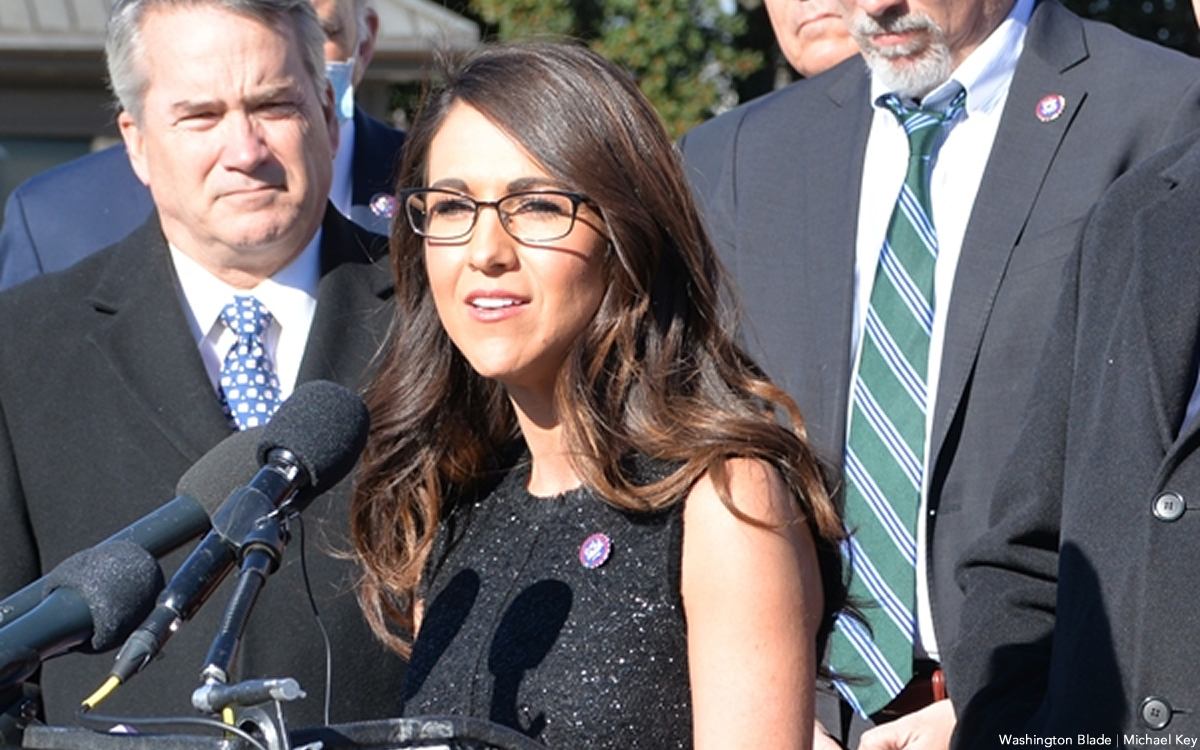
A group of Republican lawmakers have demanded the International Olympic Committee ban transgender athletes from women’s athletic competitions.
The lawmakers — U.S. Sens. Jim Risch (R-Idaho), Mike Crapo (R-Idaho), Jim Banks (R-Ind.), Marsha Blackburn (R-Tenn.), Steve Daines (R-Mont.), Lindsey Graham (R-S.C.), Josh Hawley (R-Mo.), Jim Justice (R-W.Va.), James Lankford (R-Okla.), Tim Sheehy (R-Mont.), and Tommy Tuberville (R-Ala.) and U.S. Reps. Burgess Owens (R-Utah), Lauren Boebert (R-Colo.), Vern Buchanan (R-Fla.), Tim Burchett (R-Tenn.), Dan Crenshaw (R-Texas), Brad Finstad (R-Minn.), Craig Goldman (R-Texas), Mark Green (R-Tenn.), Ashley Hinson (R-Iowa), Mike Kennedy (R-Utah), Nick LaLota (R-N.Y.), Blake Moore (R-Utah), Riley Moore (R-W.Va.), Austin Pfluger (R-Texas), John Rose (R-Tenn.), and Claudia Tenney (R-N.Y.) — made the demand in a letter they sent to IOC President Thomas Bach on Tuesday.
“In the United States, we honor our female Olympians. These athletes, and so many others, have inspired generations of young women around the world to compete and excel. Their legacy underscores the vital importance of fairness in women’s sports at every level of competition,” reads the letter. “Future Olympians are counting on the IOC to protect the opportunities of women and girls to contribute to this proud tradition.”
“To do so, the IOC must base eligibility for women’s athletic competitions on biological sex,” it adds. “Allowing biological males to compete in women’s categories undermines competitive opportunities, safety, and respect for female athletes.”
The IOC in 2021 adopted its “Framework on Fairness, Inclusion and Nondiscrimination on the Basis of Gender Identity and Sex Variations” that includes the following provisions:
• 3.1 Eligibility criteria should be established and implemented fairly and in a manner that does not systematically exclude athletes from competition based upon their gender identity, physical appearance and/or sex variations.
• 3.2 Provided they meet eligibility criteria that are consistent with principle 4 (“Fairness”, athletes should be allowed to compete in the category that best aligns with their self-determined gender identity.
• 3.3 Criteria to determine disproportionate competitive advantage may, at times, require testing of an athlete’s performance and physical capacity. However, no athlete should be subject to targeted testing because of, or aimed at determining, their sex, gender identity and/or sex variations.
The 2028 Summer Olympics will take place in Los Angeles.
President Donald Trump on Feb. 5 issued an executive order that bans trans women and girls from female sports teams in the U.S. The Human Rights Campaign and other advocacy groups criticized Democratic California Gov. Gavin Newsom last week after he said it is “deeply unfair” to allow trans athletes to compete in women’s sports.
The Guardian on Feb. 25 reported the State Department has ordered consular officials “to deny visas to transgender athletes attempting to come to the U.S. for sports competitions, and to issue permanent visa bans against those who are deemed to misrepresent their birth sex on visa applications.” A travel advisory for trans and nonbinary people who are planning to visit the U.S. that the German government issued last week specifically notes the Trump-Vance administration has banned the State Department from issuing passports with “X” gender markers.
The letter notes Trump’s Feb. 5 executive order, and indicates the signatories “stand united with Secretary of State Marco Rubio and President Trump in calling on the IOC to amend its standards and safeguard the opportunities of female athletes on the Olympic stage.”
“We urge you to reaffirm the IOC’s commitment to upholding the integrity of women’s Olympic competitions and ensure that only biological women and girls are allowed to compete in female sports categories,” reads the letter. “The Olympic Games should be a model for integrity in sports, and the next IOC president must firmly defend the rights of dedicated female athletes.”
The Los Angeles Blade has reached out to the IOC for comment.
Congress
Garcia vows not to be silenced amid U.S. Attorney’s inquiry into his criticism of Musk
Congressman received a letter from the U.S. attorney’s office in D.C.

U.S. Rep. Robert Garcia (D-Calif.) is pushing back after President Donald Trump’s interim U.S. attorney for D.C., Ed Martin, disclosed his office’s inquiry into whether the congressman’s remarks about Elon Musk earlier this month constituted a threat against a public official.
“This is completely ridiculous, to essentially threaten me with possible prosecution [and] investigations through the U.S. Department of Justice because I used a metaphor to criticize Elon Musk,” Garcia told The Bulwark’s Tim Miller during an interview on Feb. 20.
At issue is a Feb. 12 appearance on CNN during which, as Martin said in a letter to the congressman’s office, “When asked how Democrats can stop Elon Musk, you spoke clearly: ‘What the American public wants is for us to bring actual weapons to this bar fight. This is an actual fight for democracy.’”
He continued, “This sounds to some like a threat to Mr. Musk—an appointed representative of President Donald Trump who you call a ‘dick’—and government staff who work for him. Their concerns have led to this inquiry.”
Garcia’s comments came just after he participated in the first House subcommittee hearing on Musk’s DOGE, the Department of Government Efficiency, which was established by an executive order issued on the first day Trump took office.
In a statement to the Los Angeles Blade, House Democratic Leader Hakeem Jeffries (N.Y.) said “Rep. Robert Garcia is a thoughtful, hardworking, and law-abiding legislator who serves his constituents and the nation with distinction. House Democrats will not be intimidated by far-right extremists who are determined to weaponize the criminal justice system against Congress.”
Garcia serves on the powerful House Oversight Committee as well as in the Congressional Equality Caucus, as one of its 11 LGBTQ+ co-chairs. In November, he was elected the Democratic Caucus Leadership Representative.
“I’ve talked to a lot of folks, members of the House and others, who have been very supportive.” he said on Feb. 20. “I said, ‘Look, we can’t allow this singling out of me. It’s not really about me, right? This is about silencing critics and critics in Congress.’”
Later in the interview, he added “we’re talking to the appropriate folks, and of course, talking to folks in the Democratic leadership” who understand the broader stakes in terms of “our job” as House Democrats to “be the loyal opposition.”
U.S. Rep. Gerald Connolly (Va.), the Oversight Committee’s top Democrat, also issued a statement condemning Martin’s letter:
“This is a shameful attempt to silence and stifle congressional oversight. Mr. Martin—an organizer, financier, and legal representative for the January 6th insurrection—is weaponizing the Justice Department to carry out the president’s retribution tour.
“This ‘Operation Whirlwind’ is a smokescreen meant to distract from the true intentions of the Trump administration: Silencing criticism and snuffing out any attempt to exercise oversight of their misdeeds and perversion of the law. I can assure you that Congressman Garcia and our fellow Oversight Democrats will not be deterred by these threats, and we will continue to fight to safeguard our democracy and protect the rights of the American people we serve.”
Martin on Feb. 19 announced “Operation Whirlwind,” a new initiative to prosecute threats against public officials at all levels of government, which some critics and legal experts believe is primarily intended as a means of silencing criticism.
In addition to Garcia, Martin has sent letters to the Senate’s Democratic Leader Chuck Schumer (N.Y.) on Jan. 21, Feb. 3, and Feb. 11, indicating plans to review remarks he made in 2020 to see if they constituted unlawful threats against two of Trump’s U.S. Supreme Court nominees, Brett Kavanaugh and Neil Gorsuch.
“I want to tell you, Gorsuch,” Schumer said, “I want to tell you, Kavanaugh—you have released the whirlwind and you will pay the price. You won’t know what hit you if you go forward with these awful decisions.”
The top Senate Democrat was speaking during a rally about the conservative jurists’ potential revocation of decades-old constitutional protections for abortion, which they ultimately did in 2022 with their 5-4 decision in Dobbs v. Jackson Women’s Health Organization.
As detailed by aide to the senator in his response to Martin, “on March 5, 2020, the day after the comments referenced in your letter, Senator Schumer made the following remarks” from the Senate floor:
“Now, I should not have used the words I used yesterday. They didn’t come out the way I intended to. My point was that there would be political consequences—political consequences—for President Trump and Senate Republicans if the Supreme Court, with the newly confirmed Justices, stripped away a woman’s right to choose.
“Of course, I didn’t intend to suggest anything other than political and public opinion consequences for the Supreme Court, and it is a gross distortion to imply otherwise. I am from Brooklyn. We speak in strong language.
“I shouldn’t have used the words I did, but in no way was I making a threat. I never—never—would do such a thing. Leader McConnell knows that, and Republicans who are busy manufacturing outrage over these comments know that too.”
The aide concluded, “As Senator Schumer’s statement on the Senate floor confirmed, the comments were not a threat to physically harm any person. I hope that this clarifying information is helpful.”
Shortly after Trump’s appointment of Martin, the conservative lawyer and activist dismissed pending cases against rioters who sacked the Capitol building on Jan. 6, 2021, fired the prosecutors who were involved, and began investigations into those who brought obstruction charges that were ultimately invalidated by a U.S. Supreme Court decision in June.
Barbara McQuade, a former federal prosecutor who teaches law at the University of Michigan and serves as a legal analyst for NBC News and MSNBC, told the Washington Post she had “never seen anything like these letters from a U.S. attorney,” who would typically assign agents to lead such a probe while abiding the Justice Department’s policy of not confirming or denying the existence of any investigation.
“It seems like a fair inference that these letters are designed more to chill free speech than to seek clarification, as they purport to do,” McQuade added.
Garcia agreed, telling Miller that the effort “could have a chilling effect on other folks that actually want to come out and criticize and oppose” Trump, Musk, the administration, or their allies.
Looking ahead, Martin has “given me, by the way, till Tuesday to respond to this letter,” Garcia noted. When asked about what he planned to do, the congressman said “we’re having some conversations about that” but “what we’re not going to do is stay silent.”
“The lesson here is not to retreat,” he said. “The lesson here is to push harder and continue to let people know they are literally trying to limit free speech.”
Discussing his remarks about Musk during an appearance on CNN on Feb. 20, Garcia said “what’s really critical at this moment, I think, for all of us to understand, is that we should be allowed to speak freely, and we certainly should be allowed to use figures of speech, and anyone that watches that can see that as a figure of speech or a metaphor in the way we’re describing this fight.”
The congressman added, “And it is a fight. This is a fight for democracy.”
Congress
LGBTQ+ lawmakers, advocacy groups condemn GOP’s anti-trans sports ban
Several members raised their objections to the bill in speeches on the House floor
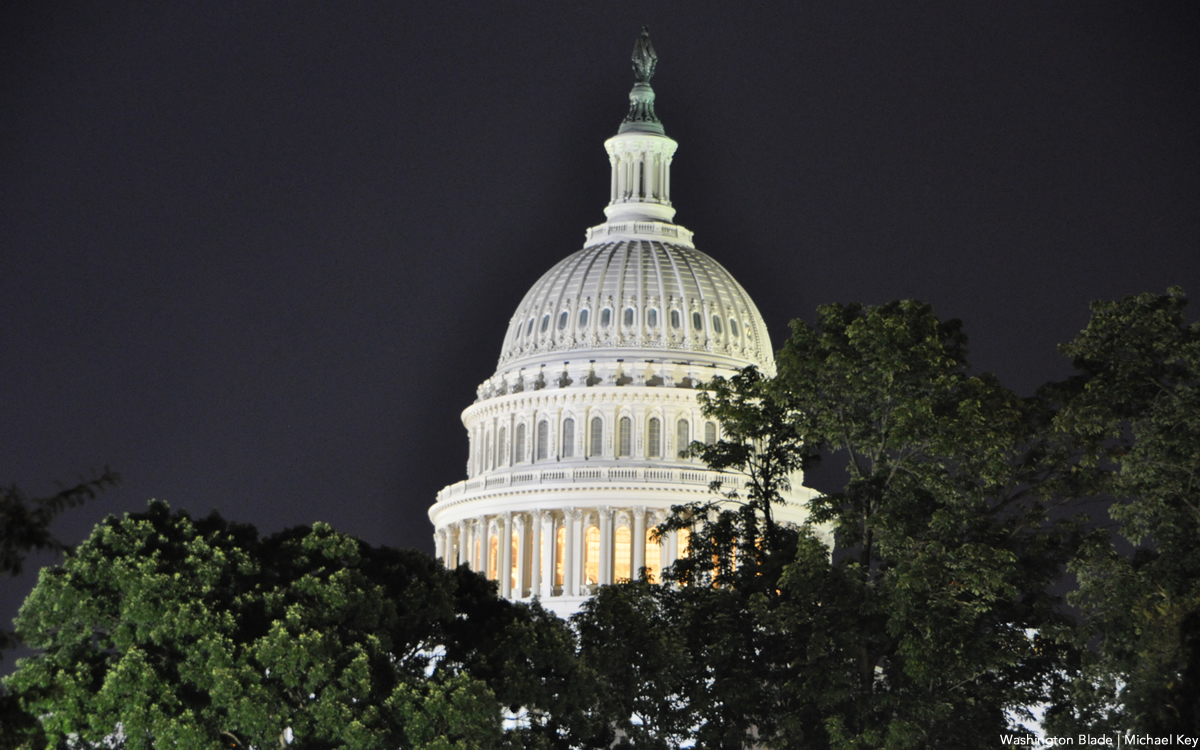
LGBTQ+ and civil rights advocacy groups and Democratic lawmakers in the U.S. House of Representatives denounced legislation passed on Tuesday by the Republican majority that would prohibit schools that receive federal education funding from allowing transgender students to participate in girls’ and women’s sports.
As the bill was brought to a vote, ultimately passing 218-206, Democrats slammed the measure in speeches on the House floor, statements from their congressional offices, and social media posts. Among them were the out LGBTQ+ leadership of the Congressional Equality Caucus and several allies who serve as vice-chairs.
Freshman U.S. Rep. Sarah McBride, the first transgender member of Congress, did not participate in the floor debate.
“Republicans are moving a bill that would ban transgender students of all ages from participating in sports and put all female athletes at risk for harassment and abuse,” U.S. Rep. Mark Takano (D-Calif.), who is gay and chairs the Equality Caucus, said in a video on X.
“This sports ban opens the door to subjecting all female students to secret investigations, intrusive demands for medical tests, or reviews of their private medical information,” he said. “This bill is so vaguely written that it could force any girl to undergo invasive medical exams to ‘prove’ that they are a girl.”
The congressman continued, “This bill isn’t about equity. It isn’t about fairness. It is a weaponization of the federal government against a small group of people at the expense of privacy rights for all students.”
“It does nothing to address the real inequities that female athletes face,” Takano said, “and instead overrides the authority of interscholastic and intercollegiate sports federations, as well as athletic organizations.”
Instead of lowering costs, House Republicans are pushing an anti-trans sports bill that would threaten student athletes with intrusive exams and jeopardize the fairness and safety of female athletics. pic.twitter.com/zTqeprJYXj
— Mark Takano (@RepMarkTakano) January 14, 2025
Gay U.S. Rep. Mark Pocan (D-Wis.), who chaired the caucus in the previous Congress and now serves as a co-chair, said “No bill is before us to lower costs for Americans, instead it is a political attempt to divide us as a nation, stigmatizing some kids so some adults can get MAGA merit badges.
“The Republican governor of Utah vetoed a similar piece of legislation after he shared that of the 75,000 students in high school sports in Utah, only four were trans, and only one a girl playing sports. But he also mentioned the very real 86% of trans kids reporting suicidality due to issues like adults stigmatizing kids for political gain.
“Instead, today, the proposed solution is in search of an actual problem. Suggests we somehow ban girls from sports with some sort of process to determine who is a girl. Does this mean hiring potential predators to peek at the private parts of kids in locker rooms?
“Now that sounds like an actual problem to me, creating a solution to a non-existent problem by creating a problem instead of lowering costs for Americans as a sign of an ineffective congressional majority at best, I urge a no vote, and I yield back.”
The House GOP's trans sports ban would subject girls as young as four to invasive physical inspections of their private parts by adult strangers.
— Rep. Mark Pocan (@RepMarkPocan) January 14, 2025
Yes, really.
Republicans should focus on lowering costs instead of a bill that puts ALL girls at risk. pic.twitter.com/O8uRj9OKpl
U.S. Rep. Becca Balint (D-Vt.), a lesbian co-chair of the caucus who previously taught middle school history and social studies, delivered an impassioned floor speech, telling Republican House Speaker Mike Johnson (La.) “I rise in fierce opposition to this bill”:
“Trans Americans are not the problem. This obsession with monitoring kids’ genitals is absolutely the problem.
“Let’s be clear. This is about kids. My kids, your kids, all kids. All kids, even elementary school kids playing basketball. I’m a mom of two teens. I’m a former teacher. I know what kids are going through in school. They are already self-conscious about their bodies. They just want to be on the soccer field with their friends. They certainly do not want to be humiliated by members of Congress.
“So, come on, let’s talk about what enforcement looks like, because you guys, you don’t want to talk about it. We know there is only one logical conclusion to this. This is interrogation of young girls. About their bodies. This is asking people to show them what is underneath their underwear.”
“That is what we’re talking about. This is the logical conclusion for this bill. So, it’s vile. It’s twisted. They don’t want to talk about the details. It’s an absolute invasion of children’s privacy. Far from protecting anyone, it puts our children at risk. And actually, I urge colleagues on both sides of the aisle to reject this government overreach.”
Banning trans kids from sports solves *none* of the problems that Americans are facing.
— Rep. Becca Balint (@RepBeccaB) January 14, 2025
Let's be real: Trans kids aren't the reason we can't afford groceries. Trans kids aren't the reason young people are giving up on ever owning a home.
Corporate greed is. pic.twitter.com/sKRzm1DGTk
Gay caucus co-chair U.S. Rep. Robert Garcia (D-Calif.) voiced his opposition to the bill in a post on X.
House Republicans brought up a bill designed to hurt trans youth and athletes and ban them from playing sports in schools. The real effect beyond that cruelty is it would allow gender checks on young girls and athletes. This was sick and shameful and I voted NO.
— Congressman Robert Garcia (@RepRobertGarcia) January 14, 2025
Other out LGBTQ+ Democratic co-chairs of the caucus spoke out from the House floor on Tuesday.
An especially comprehensive floor speech came from U.S. Rep. Suzanne Bonamici (D-Ore.), a caucus co-chair, who began her remarks by proclaiming that “the so-called Protection of Women and Girls in Sports Act” will “actually do the opposite and make sports more dangerous for women and girls.” The congresswoman said:
“This bill is a ‘one size fits all’ approach that would apply equally to every sport from K-12 schools to colleges. Currently schools, parents, and communities manage youth sports leagues and write rules about who can participate in different sports at different levels. Many states, schools, and athletic associations across the country have allowed equal participation for transgender athletes for years and it’s working just fine.
“This legislation would revoke all federal funding from schools that include transgender students on girls’ and women’s sports teams. This is damaging and discriminatory to transgender students, who benefit, as all students do, from participating in school sports, and also damaging to the entire school that’s threatened because federal funding benefits all students.
“Keep in mind, colleagues, that as of last month, of the approximately 510,000 athletes who play at the NCAA level — 10 are transgender. Not 10,000. Ten. Out of 510,000.
“Transgender students — like all students — they deserve the same opportunity as their peers to learn teamwork, to find belonging, and to grow into well-rounded adults through sports. Childhood and adolescence are important times for growth and development, and sports help students form healthy habits and develop strong social and emotional skills. Sports provide meaningful opportunities for kids to feel confident in themselves and learn valuable life lessons about teamwork, leadership, and communication. Teams provide a place for kids to make friends and build relationships.
“Yet my colleagues across the aisle want to take these opportunities away from certain children; that’s discriminatory and it’s wrong.
“My colleagues are apparently so afraid of people who are different from them that they’ve manufactured false and dangerous presumptions based on outdated stereotypes about transgender people, especially transgender women and girls.
“Additionally, there is no way this so called “protection” bill could be enforced without opening the door to harassment and privacy violations. It opens the door to inspection, not protection, of women and girls in sports. Will students have to undergo exams to “prove” they’re a girl? We are already seeing examples of harassment and questioning of girls who may not conform to stereotypical feminine roles; will they be subject to demands for medical tests and private information? That’s intrusive, offensive, and unacceptable, especially from a party of limited government.
“I want to be very clear, there are real problems harming women and girls in sports, but transgender students are not why. Today, we should be working to solve the real, pervasive problems in athletics that deter women and girls from participating, including sexual harassment and assault, lack of equal resources, and pay inequality.
“We should be working on those issues, and also on the issues that improve the lives of the people we represent back home, like increasing access to affordable health care and housing, lowering costs for everyday Americans, and fighting the climate crisis.
“But instead, here we are again. We’ve seen this time and time again—Republicans fearmonger about the trans community to divert attention from the fact that they have no real solutions to help everyday Americans with the pressing problems they face.
“We must not discriminate against kids because of who they are. Transgender youth already face high hurdles, and research shows that this type of discriminatory policy is associated with declines in mental health and higher suicide risk among already threatened LGBTQI+ youth. We don’t need adults in Congress making things worse.
“As Republican Governor Spencer Cox from Utah said in his veto statement of a similar bill, “When in doubt, however, I always try to err on the side of kindness, mercy, and compassion.”
“Republicans, who have voted consistently against the Violence Against Women Act, who have taken the rights of all women to have control over their own body, who as women are bleeding out in parking lots, now want to pretend today that they care about women,” U.S. Rep. Alexandria Ocasio Cortez (D-N.Y.), a vice-chair of the caucus, said in a floor speech.
She continued, “And why? To open up genital inspection on little girls across this country in the name of attacking trans girls. We have two words. Not today.”
AOC: Republicans who have voted against consistently against the violence against women act, who have taken away the rights of all women to choose and have control over their own body, now wants to pretend today that they care about women. pic.twitter.com/7FRqELTrjV
— Acyn (@Acyn) January 14, 2025
These and other House Democrats began calling the legislation the “GOP Child Predator Empowerment Act” to highlight the risk that if it becomes law, the ban could lead to genital exams of minor student-athletes by adults and therefore might help facilitate child sexual abuse.
While the House Education Committee chair, U.S. Rep. Tim Walberg (R-Mich.), said that birth certificates should be used to settle questions about students’ gender, the bill’s opponents said the absence of a workable enforcement mechanism leaves open a range of ways in which students’ bodies and privacy could be violated.
U.S. Rep. Sara Jacobs (D-Calif.), for instance, who is also a vice-chair, noted in her floor speech that “We have already seen an investigation like this” into a student’s gender “at a high school in Utah, and unsurprisingly, they targeted someone who wasn’t trans.”
She was referring to a case in Utah in 2022 that was kicked off when the parents of athletes who placed second and third in in a state level competition suspected the winner might be trans and filed a complaint the Utah High School Activities Association. Records showed her sex was listed as female since kindergarten.
Advocacy groups
“Just five days after Florida Governor Ron DeSantis signed an anti-transgender sports ban in 2021, a cisgender girl faced brutal harassment from the sidelines at a lacrosse game simply because she had short hair,” the Human Rights Campaign wrote in a press release Tuesday that highlighted many of the same harms addressed by House Democrats who rose in objection to the bill.
“We all want sports to be fair, students to be safe, and young people to have the opportunity to participate alongside their peers,” HRC President Kelley Robinson said in a statement included in the release. “But this kind of blanket ban deprives kids of those things. This bill would expose young people to harassment and discrimination, emboldening people to question the gender of kids who don’t fit a narrow view of how they’re supposed to dress or look.
Robinson added, “It could even expose children to invasive, inappropriate questions and examinations. Participating in sports is about learning the values of teamwork, dedication, and perseverance. And for so many students, sports are about finding somewhere to belong.”
“We should want that for all kids — not partisan policies that make life harder for them,” she said.
HRC also argued that excluding trans women and girls from competitive athletics, denying them the benefits to their physical and mental health that come with participating in sports, can cause tremendous harm since these students “face higher risk of anxiety, depression, and bullying” than their cisgender peers.
In Monday in advance of the debate and floor vote, 405 national and local civil rights, education, and gender justice organizations joined a letter issued on Monday by the Leadership Conference on Civil and Human Rights urging House lawmakers to reject the Protection of Women and Girls in Sports Act.
“Although the authors of the legislation represent themselves as serving the interests of cisgender girls and women, this legislation does not address the longstanding barriers all girls and women have faced in their pursuit of athletics,” the letter reads, in part. “Instead of providing for equal facilities, equipment, and travel, or any other strategy that women athletes have been pushing for for decades, the bill cynically veils an attack on transgender people as a question of athletics policy.”
“We are fortunate that transgender, nonbinary, and intersex people are present in our community, and we fully embrace them as members of our community,” the signatories wrote. “As organizations that care deeply about ending sex-based discrimination and ensuring equal educational opportunities, we support laws and policies that protect transgender people from discrimination, including full and equal participation in sports, access to gender-affirming care, access to school facilities, and access to inclusive curriculum. We firmly believe that an attack on transgender youth is an attack on civil rights.”
Along with HRC, which is the nation’s largest LGBTQ+ rights organization, other advocacy groups that signed the Leadership Conference’s letter also issued separate statements Tuesday following passage of the bill.
Among them was GLAAD, whose President and CEO Sarah Kate Ellis said “Legislators who voted today in favor of banning transgender girls from participating in school sports should be ashamed of themselves.”
“Right now, gun violence is the number one cause of death to American children, yet extremist lawmakers ignore this reality to push bills that further endanger and isolate LGBTQ youth who just want to be themselves and play with their friends.
“Legislators have an obligation to stand up for all, not just some, of their constituents. Allowing students to participate in sports is about equal opportunity, the ability to make friends and belong, and stay active, healthy and happy. Young transgender people should not have to watch lawmakers debate their basic humanity.
“Legislators must meet with transgender youth, their families, teammates, and coaches who would be harmed by this dangerous legislation; propose ways to protect all youth; and stop pushing anti-LGBTQ discrimination in a phony attempt to protect women and girls. Protect all kids and let them play.”
GLBTQ Legal Advocates and Defenders (GLAD Law) Senior Director of Transgender and Queer Rights Jennifer Levi said, “It’s disgraceful to see the new Congress make one of its first priorities a sweeping bill that would deny transgender kids of any age the opportunity to play school sports and strip from them the many educational benefits sports provide.”
“Thoughtful policies can successfully balance fairness and inclusion in sports at multiple levels of competition, as local school districts and sports associations have done for many years,” she said. “We appreciate those in Congress who voted against this extreme bill and hope the Senate will recognize that blanket bans imposed by politicians don’t serve athletes, students, or sport.”
Despite the 53-vote GOP majority in the Senate, Republicans will need seven Democrats to support the sports ban for the bill to pass, which is unlikely. Still, President-elect Donald Trump promised to intervene with executive action, which would likely mean directing the U.S. Department of Education to investigate schools that allow trans women and girls to compete in sports for violations of federal law prohibiting sex-based discrimination.
He and the conservatives backing the Protection of Women and Girls in Sports Act believe athletes whose birth sex is female have actionable Title IX claims on the grounds that they are unfairly disadvantaged when competing against their transgender counterparts, even though the research on this question is mixed.
In a fundraising email, the LGBTQ Victory Fund denounced the effort by House Republicans to “rewrite Title IX, the federal civil rights law that prohibits sex discrimination in educational institutions,” adding that “The author of this hateful bill” U.S. Rep. Greg Steube (R-Fla.) “even went so far as to claim trans people and trans identities are made up, before launching into a transphobic rant!”
Speaking from the House floor on Tuesday, the GOP congressman said, “Our culture and civilization continue to be subject to the perverse lie that there are more than two genders or that men can be women and women can be men.”
Allison Scott, director of impact and innovation at the Campaign for Southern Equality, said: “The passage of HB28 by the U.S. House of Representatives is a cruel and unjust abuse of power that targets a very small number of young people who just want to play school sports with their friends.
“It’s appalling that one of the first priorities of this new Congress is to bully children with the weight of a federal law. I want to send a clear message to transgender young people and their families: No law can strip you of your inherent dignity and humanity, and we will never stop working alongside you and a huge community nationwide to ensure all people can live authentically and with joy.
“The Senate should do the right thing here, refuse to exclude and marginalize children, and reject this legislation.”
-
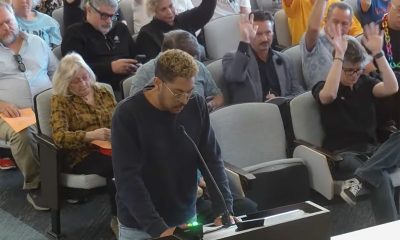
 Riverside County4 days ago
Riverside County4 days agoYesterday, Palm Desert residents shut down Councilmember’s “hateful” proposal to remove City’s Pride Month resolution
-

 Sports3 days ago
Sports3 days agoLA County contributes over $181K to Out Athlete Fund for Pride House LA/West Hollywood
-

 National5 days ago
National5 days agoAs house Democrats release Epstein photos, Garcia continues to demand DOJ transparency
-

 Politics5 days ago
Politics5 days agoLGBTQ Democrats say they’re ready to fight to win in 2026
-

 National5 days ago
National5 days agoWhite House deadnames highest-ranking transgender official
-

 Politics5 days ago
Politics5 days agoGeorge Santos speaks out on prison, Trump pardon, and more
-

 Books2 days ago
Books2 days ago‘Dogs of Venice’ looks at love lost and rediscovered
-

 Crime & Justice3 days ago
Crime & Justice3 days agoSan Fernando Valley LGBTQ+ community center Somos Familia Valle is trying to rebuild from a “traumatizing” break-in
-

 a&e features11 hours ago
a&e features11 hours agoAllison Reese’s advice? Take your comedic medicine.

